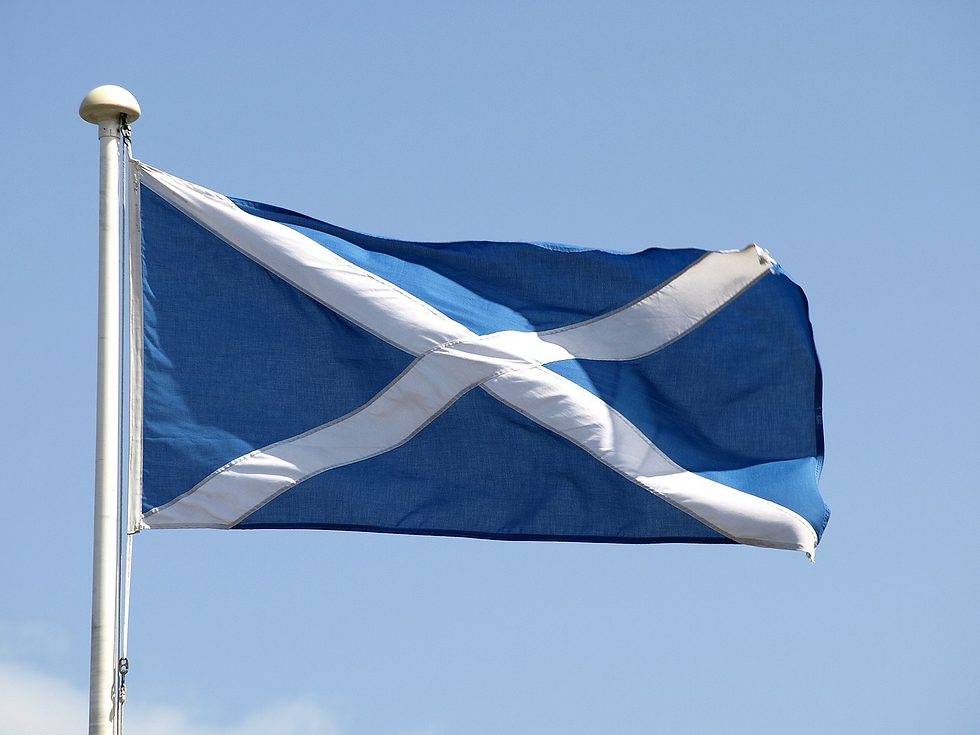Scotland: The Independence Debate
- Dylan Davies

- Jun 20, 2021
- 3 min read
Updated: Dec 23, 2024
The popularity of Nicola Sturgeon and her Scottish National Party was displayed once more on the 6th of May 2021 - in the 6th election since devolution was achieved in the nation. Since the SNP’s first unprecedented win in the spring of 2007, the political landscape of Scotland has changed dramatically, with many asking if the nation of Scotland could forge its own path on the international stage.
First Minister Nicola Sturgeon faced challenges in the run up to the election, however these did not have as much of an effect as many had feared, with her party gaining a single crucial seat, and increasing their total vote share by 1% compared to the 2016 election. The 2021 election was the first where 16 and 17 year olds could vote, and it was an election that put independence in the spotlight once more. With the goal of independence becoming more popular amongst the youngest voters, it could be a matter of time before Scotland becomes the newest nation in Europe.

Overall, pro-independence parties gained a majority in Holyrood (Scotland’s devolved parliament) with the backing of the Scottish Green Party led by Lorna Slater and Patrick Harvey. A Green Party that has not seen success nationally or in other devolved parliaments will prove crucial to Sturgeon’s independence goal, as their 6 seats cement the independent supporting majority in parliament.
Since the “once in a generation” referendum in 2014, support for independence has fluctuated with support for ‘yes’ only falling below 40% a handful of times according to one polling source. During the height of the COVID-19 pandemic, Nicola Sturgeon gained an international reputation for her pandemic response, with some even deeming her the most impressive current UK leader. Sturgeon is renowned for her decisiveness as a leader and her case for independence all over Europe. However, in recent times, support has fallen under 50%, with the most recent poll in May showing 43% in favour of independence.
When looking at the campaign for Scottish independence, it is obvious that the road to a new Scotland will be lined with obstacles, some easy to overcome, and some that will make or break the dream. One of the most recent obstacles was from inside the SNP itself. Former leader and first minister, Alex Salmond, broke off from the dominant independence party to create his own in the form of Alba: a move that some analysts believed would split the vote of pro-independence parties, forcing Sturgeon into a coalition. However, Salmond only achieved 1.7% of the vote, making the party ineligible for any seats. showing the strong grip that the SNP have achieved on Scotland since their first win in 2007.
The economics of independence proves one of the most significant arguments against independence, says Michael Keating, a politics professor from Aberdeen University. He argues that independence would remove Scotland from the larger UK economy and take away from a wide market that could trade Scottish goods. Many argue, however, that Scotland could thrive on its own, with figures estimating that there were £5.5 billion worth of exports from Scotland to the United States in 2017. This paired with Scotland’s estimated 96% of the UK’s crude oil production could set a firm foundation for the independence of Scotland.
Perhaps the biggest obstacle in this campaign is the law. Prime Minister Boris Johnson (Conservative) has warned against the legality of a second referendum on independence (more commonly known as Indyref2). For this referendum to be held, various laws would have to be passed, including a law that would allow Scotland to hold a referendum without a Section 30 order. This is an order which allows the UK government to rule on certain areas of policy in the devolved nations. Scotland would also need to seek an amendment to the Scotland Act of 1998, along with a Section 30 order to make sure the referendum is legally binding. However, these laws are laws that Holyrood might not have the power to introduce under the current devolution agreements, meaning they would need backing from UK government ministers. If the SNP move ahead with the introduction of bills, the UK government can launch a legal challenge, which could lead to a battle in the Supreme Court, and leave any referendum in doubt. In spite of this, Ms Sturgeon is defiant, telling Mr Johnson that a second referendum is “a matter of when, not if.”
Independence is the logical next step for many Scottish people, with support rising steadily and an ever increasing sense of disunity from the United Kingdom. Meanwhile, many unionists still use the argument of Scotland’s economy to persuade undecided voters to remain in the UK. However, new referendum does not look likely any time soon.

_edited.png)

Comments